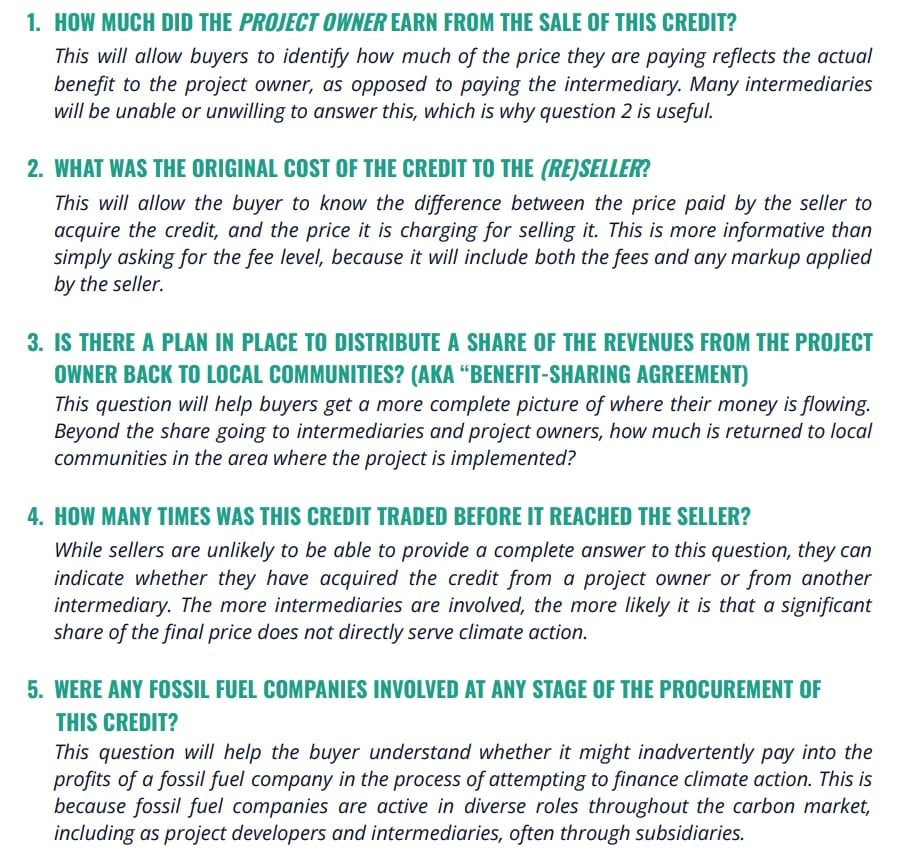Voluntary carbon credit markets (VCM) have a big role to play in financing climate actions but the actual amount of money that intermediaries earn and goes to climate projects remains unknown.
According to a study commissioned by the Carbon Market Watch, 9 out of 10 intermediaries don’t reveal the fees they charge or profits they earn. Their role in the VCM has been increasingly scrutinized.
Opaque Financial Transactions Involving Carbon Credits
Intermediaries – brokers, retailers, or exchanges of carbon credits – have been under interrogation.
Last year, an investigation noted that several brokers in the VCM are buying carbon credits from forestry projects in poorer nations and selling them at big margins. Likewise, an inquiry on SouthPole showed that the company was earning millions of dollars from brokering low-quality carbon credits.
In a similar finding, Carbon Market Watch released a report saying that 90% of the intermediaries under investigation don’t reveal the exact fees or profits earned from selling carbon credits on the VCM.
This lack of transparency in the financial transactions involving carbon credits is alarming. It doesn’t give the market players the true insight whether the VCMs are indeed successful in financing climate actions.
Plus, it also makes it impossible to measure the real amount of earnings and speculation on the part of the intermediaries. These include the emerging craze among carbon crypto companies.
This opacity has to change.
Checklist in Buying Carbon Credits
Being transparent about the information on the middlemen’s earnings per credit will allow buyers to support projects where the gap between how much they pay and what the project owner gets is the smallest. This will greatly benefit the project owners or developers, with more bargaining power with intermediaries.
So, carbon credit buyers should not be lenient anymore on demanding transparency from intermediaries. They must know what questions to ask to make informed decisions.
According to Carbon Market Watch, here are the questions that buyers must ask to channel their money to the right projects.
Carbon markets are a tool to channel finance to climate related projects. Yet, there’s limited data available to quantify it.
There is not enough data on how much finance is going to climate action through the VCM.
- The value of market size is determined by multiplying the number of trades by the estimated price.
Apart from carbon credit price transparency concerns, where the money paid by the final buyers goes is also unclear. This includes the amount of money that stays in the hands of the intermediaries and the cash that project developers make as profits.
In a best-case scenario, project developers sell directly to end buyers without the need for an intermediary. In this case, as much as 60% of revenues goes back to the climate project or local communities.
Under a worst-case scenario, brokers can take as much as 78% of the revenues of the carbon credit sales.
So why do project developers still work with brokers? Some think that they help connect with buyers and it’s convenient for price discovery.
The Role of Intermediaries in the VCM
Intermediaries have a big role to play in the VCM. They help connect project developers and carbon credit buyers.
Speculative intermediaries, in particular, are investing to buy carbon credits at a time when demand is extremely low at cheap prices. In effect, they’re still providing a lifeline to projects. But that was the case before.
Today, those speculative intermediaries are now cashing in, by reselling the credits at several times more the price they bought them. Though nothing is wrong in earning a profit, it would be if most of the money paid supposedly to finance climate action get stuck on intermediaries’ wallets.
In a report by Thallo on scaling up the VCM, $650 million went to the pockets of investors and brokers – not project developers – out of the 500 million carbon credits traded in 2021,
- That accounts for 1/3 of the revenues the VCM generated in 2021.
This is where the concept of “fair deals” comes in. It offers a floor price to project developers and includes a means to ensure that they will benefit as well if market prices rise before the credit is used.
This calls for a discussion defining “fairness” in the carbon market, which has a positive societal and environmental impact.
But if intermediaries still won’t disclose their fees and mark-ups, the real path that a carbon credit takes and the number of times it changes hands will remain secret. Keeping this information hidden will raise suspicions about who really benefits.
Thus, intermediaries must improve transparency in their transactions to also improve trust in the VCM.


